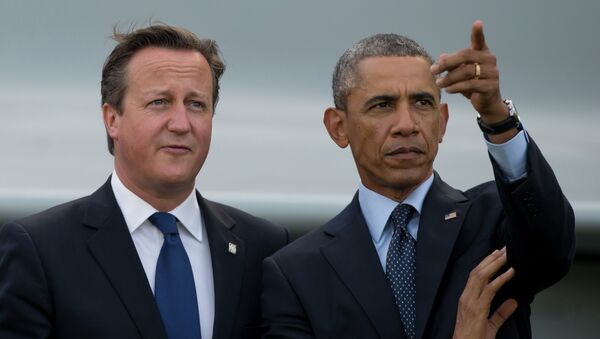Last week, US President Obama created a stir during his visit to London by threatening Brits that, if they voted to leave the European Union, they’d be "placed at the back of the queue" for trade agreements like the Transatlantic Trade and Investment Partnership.
Despite that his comments were apparently drafted by British officials – the term ‘queue’ is unusual in the American vernacular – the US President’s statement was poorly versed in domestic British politics.
For one, the highly secretive TTIP trade agreement remains extremely unpopular among a British electorate worried about the influx of potentially dangerous genetically-engineered produce from America, and the evisceration of their highly popular single-payer healthcare program.
Secondly, a threat by a foreign leader highlights concerns that continuing on the path of globalist neoliberalism imperils the country’s domestic sovereignty, by placing its public services at the whim of multinational corporate interests.
The audacity of American interventionism is not lost on the British electorate, as public opinion has turned sharply in favor of the "Leave" campaign, a demographic composed of the conservative Brexit faction concerned with national sovereignty and the left-wing Lexit coalition that demands the end of corporate-led austerity policy.
Public opinion polls released by ICM and YouGov show an expansion and consolidation of support for British exit from the EU. The Leave campaign now outpaces the "Remain" campaign by an average of two percentage points, a significant turnaround from last week when the Remain campaign held a one-point lead.
On Monday, Loud & Clear’s Brian Becker sat down with Alex Gordon, the former president of the British Rail, Maritime and Transport Workers Union and a leading voice in the Lexit movement, to discuss the surge of support for British exit from the EU following President Obama’s visit last week.
Will the Leave campaign’s surge in the poll hold?
"There is always a health warning on opinion polls, they are only opinion polls," said Gordon. "The real opinion poll will be the referendum on the 23rd of June."
"Current opinion polls coming out today are indicating that there has been a hardening of support for the leave campaign — the ICM opinion poll reported a 46% Leave support versus 44% for remaining in the EU, but they also discovered among their respondents a hardening of resolve of the leave supporters with 80% saying that they are absolutely certain to vote against remaining in the EU versus 75% prior to Obama’s visit," explained Gordon dissecting the promising polling results.
What was the reception in the British press of Obama’s comments last week?
"The way in which Obama intervened in this particular debate was particularly noteworthy, arriving early morning on Air Force One, straight into a press conference with a scripted intervention around the European Union Referendum that had been scripted for him by Downing Street officials," remarked Gordon. "Obama said in very un-American English that if British voters vote to leave the European Union then Britain will find itself at the back of the queue."
The outgoing US President is well-known for writing his own speeches, and the Lexit activist argued that Obama’s choice of words aroused suspicion about who was really behind his statement, overshadowing the content of his remarks. "That was the cat being let out of the bag because that remark wouldn’t have been scripted by a US press attache or script writer, it was written by the British foreign office for Obama – Obama would have said at the back of the line, not the back of the queue."
Why did President Obama attempt to intervene in the referendum vote?
"Obama is clearly the messenger boy of the American banks doing business in London," opined Gordon. "Goldman Sachs is bankrolling the Remain campaign, the campaign to persuade British voters to remain in the European Union. They have given a £1 million ($1.45 million) to support this campaign over the next eight weeks."
Gordon explains that American financial interests support the Remain campaign because, with the UK as part of the EU, American banks can use London to access the European single-market system. "Britain’s departure from the European Union would be a loss of [US banks] investment on this low-regulation political economy that has been established since Margaret Thatcher liberalizing London with the big bang of 1986."
Gordon elaborated that prior to Britain’s accession to the European Economic Community (the precursor to the EU) in 1973 and before rise of Thatcherism’s deregulatory mandate in 1986, London’s finance sector was a heavily regulated "cut-by-custom" environment that prevented highly-leveraged speculative investments and cross-border trading through derivatives.
Since then, London’s finance circle has been overrun by tens of thousands of senior US banking employees. "For these employees and the corporations they work for, Britain’s role and status within the European Union and the European single market is absolutely critical for their investment strategies. That is why Obama was in London," commented Gordon.
How did President Obama’s comments linking EU membership to TTIP impact public opinion?
"What we had been saying all week and which a lot of people have been responding to is that if you are against TTIP and you are against Britain being part of a global free trade agreement that is going to tie our public services to the interests of global corporations then you should vote to get out of the European Union on the 23rd of June," said Gordon.
"Obama just confirmed that what we were saying is right, if you are against TTIP, if you are in favor of public services and in favor of popular democracy then you should vote to get out of the EU because Obama just told you that you won’t get TTIP if you leave the EU," remarked Gordon.
What is the broader public opinion of the TTIP?
"It is controversial because the negotiations have taken place in complete secrecy with no legislative or public oversight of the negotiation terms," said Gordon, speaking of the unusual secrecy in which the trade pacts has been created and negotiated.
The Lexit campaigner raised concerns that the TTIP may result in the end of the country’s popular single-payer health system. "The National Health Service in Britain would be imperiled by the Transatlantic Trade and Investment Partnership because one of the protocols within TTIP allows health sector corporations to sue governments that prevent them from getting into a market – there are already very large US health businesses eager to invade and get their hands on contracts in Britain."
Ultimately, the US President may have inadvertently hammered the final nail into the coffin of Europe’s failed cooperative economic experiment by linking Britain’s EU membership to another corporate-led, job destroying trade pact.







